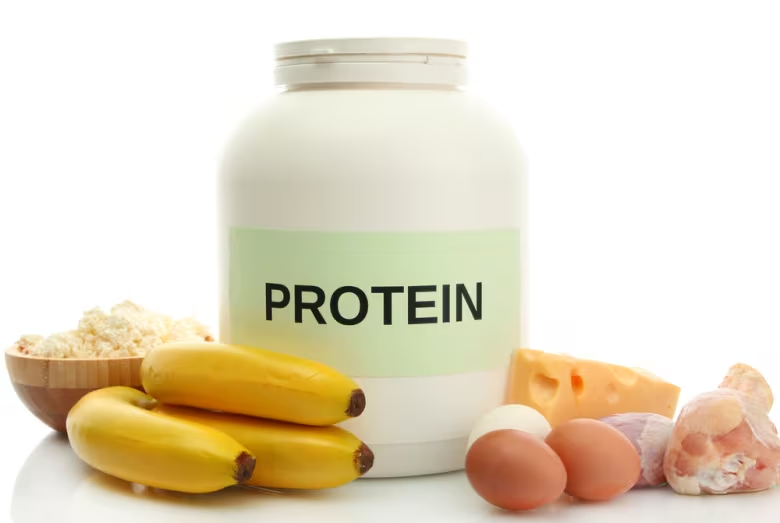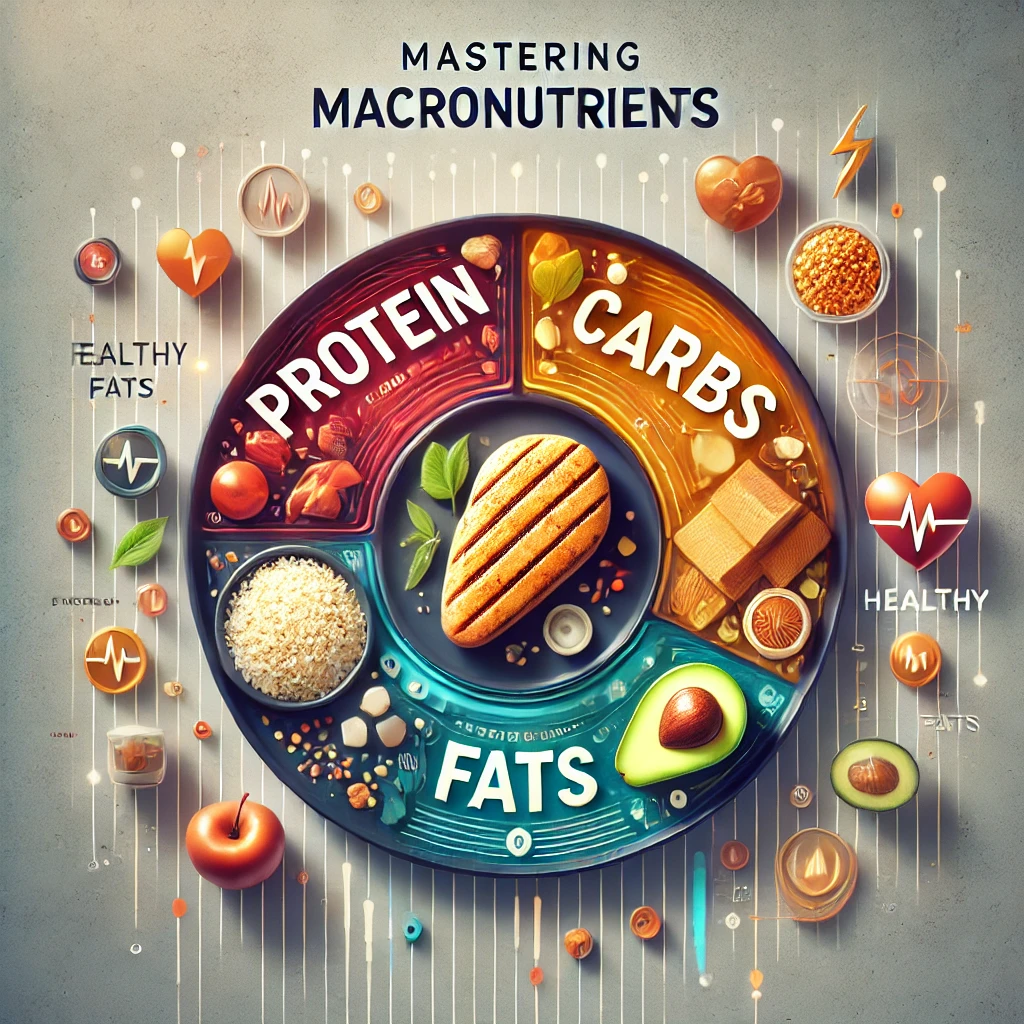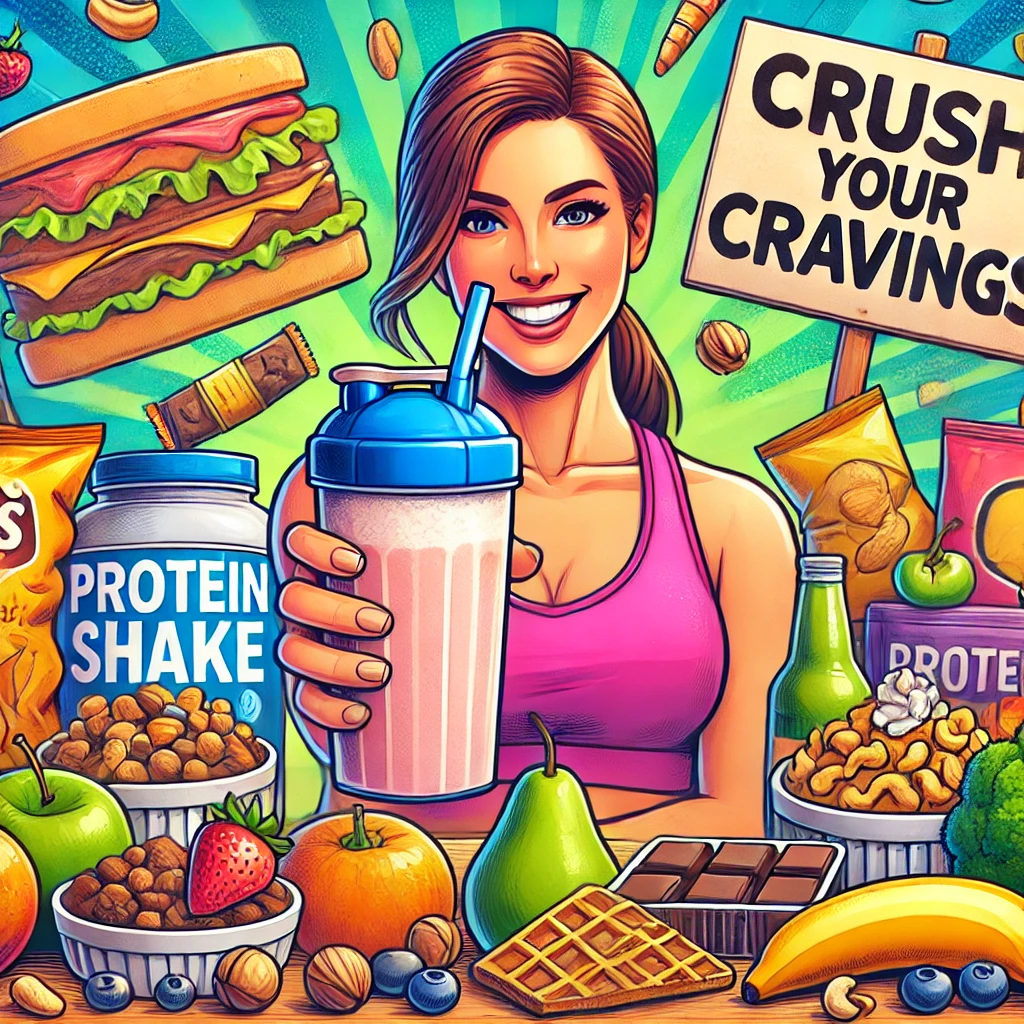Introduction
When it comes to managing weight, proteins often emerge as the hero macronutrient. While many people think of protein primarily in terms of building muscle, its role in weight loss and maintenance is equally impressive. From helping you feel fuller for longer to increasing the calories you burn, protein is a powerful tool in any weight management strategy. But how exactly does it work? Let’s dive deep into the science behind protein and explore how it plays a crucial role in weight management.
Table of Contents
What is Protein?
Protein is one of the three essential macronutrients, alongside carbohydrates and fats, that our bodies need to function properly. Made up of amino acids, protein is often referred to as the building block of life because it plays a vital role in constructing and repairing tissues, enzymes, and hormones.
There are two main types of protein: animal-based (like meat, fish, and dairy) and plant-based (like beans, nuts, and tofu). Both types are important, but animal proteins tend to be “complete,” meaning they contain all nine essential amino acids, whereas many plant-based proteins are “incomplete,” lacking one or more essential amino acids.
Proteins and Metabolism
Protein plays a crucial role in boosting metabolism, making it an essential nutrient for weight management. Our metabolic rate refers to how efficiently our body converts food into energy, and the more active this process is, the more calories we burn throughout the day. Protein has a direct impact on this process.

How Protein Impacts Metabolic Rate
Consuming protein increases your metabolic rate by requiring more energy for digestion, absorption, and utilization than other macronutrients like fats and carbohydrates. This phenomenon is part of what makes protein a powerful tool for anyone trying to lose weight or maintain a healthy weight. Simply put, your body burns more calories processing protein than it does fats or carbs.
Another way protein boosts metabolism is through muscle preservation. Protein helps build and maintain lean muscle mass, and muscle tissue is metabolically active, meaning it burns more calories at rest than fat tissue. The more muscle you have, the higher your resting metabolic rate will be, and this helps with fat loss over time.
Thermic Effect of Food (TEF) and Protein’s Role in Burning Calories
The thermic effect of food (TEF) refers to the energy expenditure required to digest, absorb, and process the food we eat. Protein has the highest TEF of all the macronutrients. Approximately 20-30% of the calories in protein are used up just in the digestion and metabolism process, compared to about 5-10% for carbohydrates and 0-3% for fats.
This higher thermic effect makes protein more calorie-burning than other nutrients. For example, if you consume 100 calories of protein, your body might use up to 30 calories just to process it, meaning the net calorie intake from protein is lower than it seems. This makes protein an ideal component of a weight-loss or weight-maintenance diet, as it helps burn more calories naturally.
Satiety: What is It and Why It Matters?
Satiety refers to the feeling of fullness and satisfaction after eating, which prevents us from overeating. It’s one of the key elements in weight management because staying fuller for longer periods helps control overall calorie intake. When satiety is well-managed, we’re less likely to reach for unhealthy snacks or overeat at meals.

The Connection Between Satiety and Weight Management
Satiety plays a significant role in weight management because it directly influences our eating behavior. If you feel satisfied after a meal, you’re less likely to snack unnecessarily or overeat during the day. On the other hand, if you’re frequently hungry, you may consume more calories than needed, leading to weight gain. Managing hunger and satiety effectively can make maintaining a calorie deficit—a key component of weight loss—much easier.
Protein is particularly effective in promoting satiety, which is why high-protein diets are often recommended for those looking to lose weight or control their hunger levels.
How Protein Boosts Satiety
Protein is particularly effective at promoting satiety. Unlike fats or carbs, protein takes longer to break down and be absorbed in the digestive system. This means that when you consume a high-protein meal, it sticks with you for a longer period, helping you feel fuller between meals.
Additionally, protein plays a role in regulating key hunger hormones. Studies have shown that protein reduces levels of ghrelin, a hormone that stimulates hunger, while increasing the levels of peptide YY, a hormone that signals fullness to your brain. This dual effect makes protein a powerful tool for managing appetite and controlling food intake.
The Role of Protein in Controlling Hunger Cravings

We’ve all been there—those late-night cravings or the urge to snack between meals. Protein can help curb these cravings. By stabilizing blood sugar levels and promoting satiety, high-protein meals prevent the blood sugar crashes that often lead to cravings for sugary or high-carb snacks. When protein becomes a staple in your diet, you’re more likely to stick to proper portion sizes and less likely to succumb to unhealthy snacking habits.
Protein and Muscle Preservation During Weight Loss
When trying to lose weight, the primary goal is typically to shed fat. However, it’s important to understand that without proper nutrition, including adequate protein intake, you can also lose lean muscle mass. This can negatively impact your metabolism and make long-term weight loss more challenging. Let’s explore why preserving muscle is essential for weight loss and how protein plays a crucial role in maintaining muscle mass during a caloric deficit.

The Importance of Lean Muscle Mass for Metabolism
Lean muscle mass refers to the amount of muscle you have that is free of fat. It’s metabolically active tissue, meaning it burns more calories at rest than fat tissue. Even when you’re not exercising, muscle requires energy to maintain itself, which boosts your overall resting metabolic rate (RMR).
The more muscle you have, the more calories your body burns, even while you’re at rest. This is why people with more muscle tend to have a higher metabolism, making it easier for them to maintain or lose weight. On the other hand, losing muscle during weight loss can lower your metabolism, making it harder to keep the weight off long-term. This is why preserving muscle is crucial when trying to lose fat without slowing down your metabolic rate.
How Protein Prevents Muscle Loss When in a Caloric Deficit
When you’re in a caloric deficit (consuming fewer calories than you burn), your body needs to find alternative energy sources to make up for the calorie shortfall. Without enough protein, your body may start breaking down muscle tissue for energy, which leads to muscle loss. This is something you want to avoid, as losing muscle decreases your metabolism and can make weight regain more likely.
Protein helps prevent muscle loss by providing your body with the amino acids needed to repair and maintain muscle tissue, even when you’re cutting calories. This is particularly important when you’re combining your weight-loss efforts with strength training or resistance exercises, which further support muscle retention and growth. Eating enough protein ensures that your muscles have the necessary building blocks to stay strong, even during periods of fat loss.
In summary:
- Protein intake helps preserve lean muscle mass by providing the necessary amino acids.
- Muscle preservation keeps your metabolism higher, which helps you burn more calories and makes it easier to sustain weight loss over time.
For those in a caloric deficit, aiming to consume around 1.2 to 2.2 grams of protein per kilogram of body weight can help support muscle preservation and promote fat loss without compromising your metabolism. This combination of a high-protein diet and strength training is one of the most effective ways to lose fat while maintaining muscle, leading to more sustainable, long-term weight loss.
Protein and the Thermic Effect of Food
Protein has the highest thermic effect of all macronutrients, meaning your body burns more calories processing it than it does with fats or carbohydrates. In fact, up to 30% of the calories in protein are burned off during digestion. This phenomenon, known as thermogenesis, makes protein particularly effective at boosting metabolism and aiding in weight loss. Simply put, eating protein can help you burn more calories throughout the day.
Protein in Different Weight-Loss Diets
Protein plays a pivotal role in many popular weight-loss diets, whether they’re high-protein regimens like Keto and Atkins or more balanced approaches. Let’s break down the effectiveness of these different strategies and how they impact weight loss.
High-Protein Diets (e.g., Keto, Atkins) and Their Effectiveness
High-protein diets, such as Keto (Ketogenic diet) and Atkins, emphasize reducing carbohydrate intake and increasing protein and fat consumption. These diets are particularly effective for weight loss because they promote the body’s reliance on fat as the primary source of energy, a state known as ketosis in the case of the Keto diet.
- Keto Diet: This diet is extremely low in carbohydrates (typically less than 5-10% of daily intake), which forces the body to burn fat for fuel, resulting in rapid fat loss. Protein makes up a significant portion of the diet, helping to maintain muscle mass while reducing overall body fat.
- Atkins Diet: Like Keto, the Atkins diet is low in carbohydrates, but it starts with strict carb restriction and gradually reintroduces them in later phases. Protein remains a central part of this plan, supporting muscle retention and reducing hunger throughout the weight-loss process.
Effectiveness: High-protein diets have proven effective for short-term weight loss, particularly in reducing fat while preserving lean muscle mass. They’re also known for enhancing satiety, which helps people stay on track without feeling deprived. However, long-term sustainability can be a challenge for some, especially if the diet is too restrictive.
Balanced Diets with a Focus on Protein Consumption
While high-protein diets like Keto and Atkins can deliver rapid results, balanced diets that emphasize protein but include moderate amounts of carbs and healthy fats are often easier to maintain in the long run. These diets ensure that you’re getting the full spectrum of nutrients while still taking advantage of protein’s benefits for weight management.
In a balanced diet:
- Protein generally makes up 25-30% of daily calories.
- Carbohydrates are not eliminated but come from whole grains, vegetables, and fruits.
- Fats are healthy sources like avocados, nuts, and olive oil.
Effectiveness: Balanced diets allow for flexibility and long-term adherence, making them a great option for sustained weight loss. They ensure you’re getting sufficient vitamins, minerals, and fiber while still promoting muscle retention and satiety through an adequate protein intake.
Protein Timing and Distribution for Optimal Weight Management
When it comes to optimizing protein for weight loss, timing and distribution matter. Eating protein at strategic times throughout the day can help manage hunger, improve muscle recovery, and maximize fat loss.

Importance of Spreading Protein Intake Throughout the Day
Rather than consuming the majority of your protein at one meal, studies suggest that spreading it evenly across all meals promotes better muscle protein synthesis, which helps preserve lean muscle mass while losing fat. This even distribution also helps keep you full and energized throughout the day, preventing hunger pangs and overeating.
For example, if your goal is to consume 100 grams of protein per day, aim to spread it over three main meals and a snack:
- Breakfast: 25 grams
- Lunch: 25 grams
- Dinner: 25 grams
- Snack: 25 grams (post-workout or between meals)
This approach keeps your body in a more constant state of repair and recovery, which is especially helpful if you’re also working out.
Pre- and Post-Workout Protein Consumption for Weight Loss
Timing protein intake around your workouts can be especially beneficial for weight loss, particularly if you’re focusing on muscle maintenance and fat reduction.
- Pre-workout: Consuming protein before exercise helps prime your body to repair and build muscle during and after the workout. A snack like Greek yogurt, cottage cheese, or a small protein shake 30-60 minutes before exercising can provide your muscles with the amino acids they need to get the most out of your workout.
- Post-workout: Protein intake after exercise helps with muscle recovery and replenishing muscle glycogen, especially after strength training. It’s recommended to consume protein within 30 minutes to 2 hours after working out. Foods like a chicken breast, a protein smoothie, or eggs are excellent options for a post-workout meal.
By timing your protein intake around your physical activity, you can maximize fat loss while ensuring your muscles recover and grow, leading to better long-term results.
Best Sources of Protein for Weight Management
Choosing the right sources of protein is key to effective weight management. Both animal-based and plant-based proteins offer unique benefits, so let’s take a look at how they compare.
Animal-Based Protein: Meat, Fish, Dairy
Animal-based proteins are considered “complete” proteins, meaning they contain all nine essential amino acids. These are vital for maintaining muscle mass, promoting satiety, and supporting metabolism.
- Meat: Lean cuts of chicken, turkey, and beef are packed with high-quality protein. For weight loss, it’s important to choose lean cuts to keep fat and calorie intake in check.
- Fish: Fish like salmon, tuna, and cod not only provide protein but also contain omega-3 fatty acids, which have been shown to support fat loss, reduce inflammation, and improve heart health.
- Dairy: Greek yogurt, cottage cheese, and low-fat milk are excellent sources of protein and calcium. Greek yogurt is especially popular due to its high protein content and versatility in recipes or as a snack.
Pros of animal-based proteins include their high biological value and complete amino acid profile. However, excessive consumption of processed or fatty meats can increase calorie intake and impact heart health.
Plant-Based Protein: Legumes, Tofu, Quinoa
For those following a vegetarian or vegan diet, plant-based proteins are an excellent alternative. While many plant proteins are “incomplete” (lacking one or more essential amino acids), combining different sources can provide a complete protein profile.
- Legumes: Beans, lentils, and chickpeas are great sources of protein and fiber, which help keep you full longer. Fiber is especially beneficial for weight management as it slows digestion and controls blood sugar levels.
- Tofu: Made from soybeans, tofu is a complete plant-based protein that is low in calories and high in nutrients. It’s incredibly versatile, making it easy to incorporate into stir-fries, salads, or as a meat substitute.
- Quinoa: Unlike most grains, quinoa is a complete protein, making it a fantastic option for vegetarians and vegans. It’s also rich in fiber, vitamins, and minerals, making it a nutrient-dense addition to any meal.
Plant-based proteins tend to be lower in calories and fat, making them ideal for weight management. However, because they are typically less protein-dense than animal sources, you may need to consume larger quantities to meet your protein goals.
Protein Supplements: Do You Really Need Them?
Protein supplements, such as powders and bars, have become incredibly popular, particularly among those looking to manage their weight, build muscle, or enhance athletic performance. But the big question is: do you really need them? The answer depends on your individual goals, lifestyle, and diet.
Pros and Cons of Using Protein Powders and Bars
Protein powders and bars offer several advantages, especially in our fast-paced world. Here are some key pros and cons:
Pros:
- Convenience: Protein supplements are quick and easy to consume, making them perfect for people with busy schedules who may struggle to prepare high-protein meals.
- Portion Control: Most protein bars and shakes come with pre-measured protein amounts, ensuring you get a consistent dose.
- Customizable: Protein powders can be mixed into smoothies, baked goods, or even meals, making them versatile.
- Great for Post-Workout Recovery: After intense exercise, protein supplements can help your muscles recover and repair quickly.
Cons:
- Cost: Protein powders and bars can be expensive, especially high-quality brands. Whole foods are often a more budget-friendly way to meet protein needs.
- Added Ingredients: Many protein bars and powders contain added sugars, artificial sweeteners, preservatives, or fillers that aren’t ideal for long-term health.
- Overreliance: Some people may become too dependent on supplements, neglecting whole foods that provide not just protein, but also essential vitamins, minerals, and fiber.
While protein supplements are helpful for some, they’re not a necessity for everyone. Whole foods should always be prioritized as they provide a broader range of nutrients.
Natural Protein Sources vs. Supplements
Whole, natural protein sources like meat, fish, eggs, beans, and legumes offer more than just protein. They come packed with vitamins, minerals, and other essential nutrients that you might miss out on with supplements. For example:
- Eggs are rich in protein but also provide healthy fats, vitamins B12 and D, and choline, which are important for brain health.
- Lentils provide protein along with fiber, iron, and folate, all crucial for energy and digestive health.
On the other hand, protein supplements are refined products designed primarily for convenience. While they’re effective in increasing protein intake, they lack the nutritional complexity of whole foods. If you’re meeting your protein requirements through whole foods, supplements may not be necessary. However, for those who struggle to meet their daily protein goals due to dietary restrictions or a busy lifestyle, protein powders and bars can be a helpful addition.
Common Myths About Protein and Weight Loss
When it comes to protein and weight loss, several myths circulate that can confuse and mislead people trying to manage their weight. Let’s tackle two of the most common misconceptions.
Debunking the Myth That Too Much Protein Harms Kidneys
One common myth is that consuming a high-protein diet can damage your kidneys. This concern stems from the fact that people with pre-existing kidney conditions are often advised to limit protein intake because their kidneys may struggle to filter out protein by-products. However, for healthy individuals with no kidney issues, research shows that eating a high-protein diet does not harm kidney function.
In fact, many studies indicate that higher protein intake can be beneficial for weight management and muscle retention. Unless you have a pre-existing kidney condition, there is no need to worry about eating too much protein within a balanced diet.
Clarifying Misconceptions About Bulking Up from High Protein Diets
Another common misconception is that eating a high-protein diet will automatically make you “bulk up” or become overly muscular. The truth is, gaining muscle mass requires more than just protein intake. To bulk up, you need to be in a calorie surplus and engage in consistent strength training. Without these factors, simply consuming more protein will not result in significant muscle gain.
In fact, a high-protein diet is essential for fat loss, especially when combined with regular exercise. Protein helps preserve lean muscle mass while you lose fat, which is why it’s so beneficial for people looking to slim down without losing muscle tone. So, unless you’re deliberately working toward muscle hypertrophy with an intense training regimen, you don’t need to worry about bulking up just by increasing your protein intake.
How Much Protein Do You Really Need for Weight Loss?
Knowing how much protein you need is crucial for achieving your weight loss goals. The amount of protein required can vary based on factors such as body weight, activity level, and fitness goals.
Recommended Daily Protein Intake Based on Goals
For most people, a good rule of thumb is to consume around 1.2 to 2.2 grams of protein per kilogram of body weight each day if you are aiming for weight loss. The more physically active you are, especially if you engage in resistance or strength training, the higher your protein requirements will be. For example:
- Sedentary individuals: 1.2 grams per kg of body weight
- Moderately active individuals: 1.6 grams per kg of body weight
- Highly active individuals (e.g., athletes or bodybuilders): 2.2 grams per kg of body weight
For someone weighing 70 kg (about 154 lbs), this would translate to consuming anywhere between 84 and 154 grams of protein per day, depending on their activity level and specific weight-loss goals.
Adjusting Protein Consumption According to Activity Levels
Your daily protein intake should also be adjusted based on how active you are. For example, if you’re regularly lifting weights or engaging in intense cardio, you’ll need more protein to support muscle recovery and growth. On the flip side, if you’re less active, you won’t need as much.
Additionally, timing can be important. For optimal results, try to spread your protein intake evenly across all your meals. For example, if you’re aiming for 120 grams of protein per day, it’s better to consume 30 grams of protein per meal (breakfast, lunch, dinner, and a snack) rather than having the majority of it in one sitting. This distribution helps maximize muscle protein synthesis and prevents excessive hunger throughout the day.
Frequently Asked Questions
Can you lose weight by eating only protein?
While protein is essential for weight loss, a balanced diet that includes fats and carbohydrates is important for overall health. Relying solely on protein could lead to nutrient deficiencies.
How does protein affect belly fat?
Protein helps reduce overall body fat, including belly fat, by increasing metabolism and promoting muscle retention.
Is it possible to eat too much protein when trying to lose weight?
While protein is beneficial, consuming excessively high amounts can lead to unnecessary calorie intake, which could stall weight loss.
What are some high-protein snacks that promote weight loss?
Greek yogurt, boiled eggs, cottage cheese, and almonds are all excellent high-protein snacks that keep you full between meals.
How can vegetarians ensure adequate protein intake for weight loss?
Vegetarians can rely on plant-based sources like beans, lentils, tofu, and quinoa, and consider supplementing with plant-based protein powders if necessary.
Conclusion
Protein plays a critical role in weight management by increasing satiety, preserving muscle mass, and boosting metabolism. Whether you’re trying to lose weight or maintain a healthy lifestyle, incorporating more protein into your diet can make a big difference. By choosing high-quality protein sources and spreading intake throughout the day, you can set yourself up for long-term success in managing your weight.










